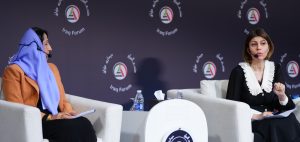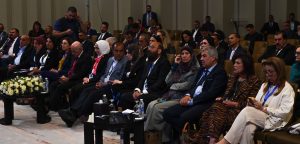- Mayan Khairy Saeed Beg, Khatoon of Yazidis
- EvanFaiq Jabro, Minister of Migration and Displaced
- Claudio Cordone, Deputy SRSG, UNAMI, Iraq
- Sarhang Hamasaeed, United States Institute of Peace, USA (Speaker/Moderator)
In his opening statements, Sarhang Hamasaeed, director of Middle East Programs at the United States Institute of Peace, referred to the UN’s involvement in direct humanitarian assistance in Iraq transitioning from providing individual assistance to system building. Iraq authorities are having to step up to take greater responsibility for displaced Iraqis, including Yazidis, in camps – around 180,000 of whom live in camps in the Kurdistan Region. Prime Minister M.S. Al-Sudani recently announced a fund of 50 billion Dinars to support the reconstruction of Sinjar in the upcoming federal budget, but it is the Kurdistan Regional Government (KRG) that is now one of the major humanitarian players in the country, with responsibility for the overwhelming majority of camp-based displaced Iraqis and Syrian refugees. Many residents are concerned as KRG officials say they are unable to plug the funding gap, calling on international NGOs instead to stay engaged. In this panel, policy makers and experts discussed the recent efforts to support reconstruction in Sinjar, and looked ahead to what more can be done to support the Yazidi community.
An historically unstable region, Sinjar is caught between Iraq’s federal government and the KRG, ravaged by ISIS’s grotesque crimes against its majority Yazidi population in August 2014. Since the removal of ISIS in Sinjar, Turkey has carried out dozens of airstrikes causing further instability to a region suffering from high unemployment and lack of services, limiting the return of displaced Yazidis to their homeland. Sinjar continues to have two separate administrations and mayors – one tied to Erbil, and another affiliated with Baghdad, based locally. After the Kurdish referendum in 2017, Iraqi security forces and Popular Mobilisation Units sought to control the Disputed Territories, including Sinjar. The security, return, and reconstruction of the region is therefore absolutely key and, should it succeed, offer a model for other troubled areas in Iraq with similarly multi-dimensional layers of state and non-state actors, combined with complex international and local dynamics.

Sarhang Hamasaeed, director of Middle East Programs at the United States Institute of Peace, opened the panel by asking Mayan Khairy Saeed Beg, Khatoon of Yazidis, for an update on the situation of her community, and the issues they face. “It’s not good,” she responded frankly. “3,000 [Yazidis] are still kidnapped, people are living in tents, our circumstances are difficult. Nothing has happened since the genocide. We don’t have services. The mass graves are still there. This is the situation so many Yazidi people face.” “We are thankful to Mr. Al-Sudani for his efforts [50 billion dinar for Sinjar reconstruction], but… frankly speaking, our situation is bad. We don’t know how long this situation will go on for and when this situation will be solved. Our situation is difficult, there is no unified administration,” she added. “If our administration is not unified, then we cannot provide basic services like health and education services.” “Our needs are directed towards the international community and the Iraqi government [and we therefore] ask the UN what they are doing to help?” Mayan Saeed Beg told the audience. “There is an agreement but we want it to be implemented on the ground, and to provide services… We haven’t seen anything for the Yazidi people yet. The Yazidi people blame me, and really I am trying to tell you the situation is getting worse, nothing is being done. Everything is on paper but when it comes to execution, nothing is there. We need people to be given services.”
Evan Faiq Jabro, the federal government’s Minister of Migration and Displaced, thanked the KRG for hosting so many displaced Yazidis – “only when they are fully willing to return home, they will return home.” Prime Minister Al-Sudani has formed a committee to look at services for Sinjar, set in the budget, she explained, although some political authorities rejected the committee. Jabro drew attention to both the Yazidi Survivors’ Law, which is in the process of implementation despite the administrative difficulties. She also referred to the more recent decision to grant Yazidi Iraqis ownership of their houses in Sinjar. “It is clear that this Iraqi government is interested in the rights of the Yazidis,” Jabro told the audience. “On a weekly basis, we meet… We check what progress is happening. The Iraqi government wants to see the return of Yazidis to Sinjar,” she said. “[The] 13,000 returnees are also an issue… 1,800 Sunni Arab returnees. We need to solve these issues with dialogue,” Jabro said. “We shall never give up returning these people, and this is our duty.”

Claudio Cordone, the Deputy Special Representative of the Secretary-General for Political Affairs and Electoral Assistance at the United Nations Assistance Mission for Iraq (UNAMI) told the audience that the key obstacle to the return of Yazidis is politics, and the true will to implement agreement. “The Sinjar Agreement is very simple, clear, and one page,” he said. “[Sometimes] we miss the accuracy of what we are talking about.” In short, Cordone told the audience, it can be summarised in three parts: 1) The administration of Sinjar, which needs a mayor; 2) Security arrangements. Only the Iraqi army should be there. Armed groups need to pull out of the district; 3) Reconstruction, which requires funding.
The most recent budget, he added, contains funding for reconstruction in Sinjar and Nineveh and funds to compensate the victims, “which are very welcome steps.” Nevertheless, Cordone emphasised the little progress that has been made on the ground in the region, particularly in security. “Everyone knows the PKK is there, and Hashd. A security force needs to be created from 1,500 individuals from the displacement camps and 1,000 from the district.” Cordone made the point that, while reconstruction is important and various agencies are designed to assist with this, without a proper mayor and without security it will mean little, giving the example of a school in Sinjar currently under control of the Sinjar Resistance Units.

“The role of local communities is so important,” he added. “This is about real people. Of course, feelings are extremely raw, we just had a genocide… It takes very little to inflame things. Look what happened when Arabs sought to return home,” he said, clarifying that the mosque was not burnt down. “It is good that we have a Yazidi Survivor’s Law,” Cordone continued. “People want accountability and justice. It’s not just about reparations, it’s about justice.” The reconstruction part is the easy part, he added. “We have other agencies on the ground like UNDP and so on, [and] on accountability we have UNITAD.” The political aspect is reliant on a mandate that will come up for renewal in a few weeks. “We are there to help where we are wanted, in terms of resolving disputes,” Cordone said. “We also want to support people to go back, and to promote accountability and justice. But the important point is that the UN does not take decisions. These all in the end depend on political will. At the end of the day, it is up to the authorities.” If there is no solution in Sinjar, Cordone told the audience, then it is not just the people who have suffered, so much that will be at stake. “It is also the reputation of authorities [KRG and federal government],” he said. A failure to abide by the agreement, will call into question whether they can abide by any promises they make.
Cordone clarified that the International Criminal Court intervenes when a country is unable to prosecute. UNITAD was therefore created to bring justice in Iraq, and is a fairly unprecedented intervention by the council. “Justice is a broad concept. It is not just reparations, it is about making sure the truth is exposed, beyond just the criminal procedures,” he said.
Concluding the session, Hamasaeed made the point that a key danger in the region is not ISIS, but unemployment. “They go to the armed groups because they are the only available jobs,” he told the audience. “We need to change the reality… Peace is possible, but we need practical efforts.”
Iraq Forum: For Stability and Prosperity
4/05/2023
Session 9: Stability in Diversity: Saving Iraq’s multi-cultural Identity: Sinjar as an Exemplar.
Session video

